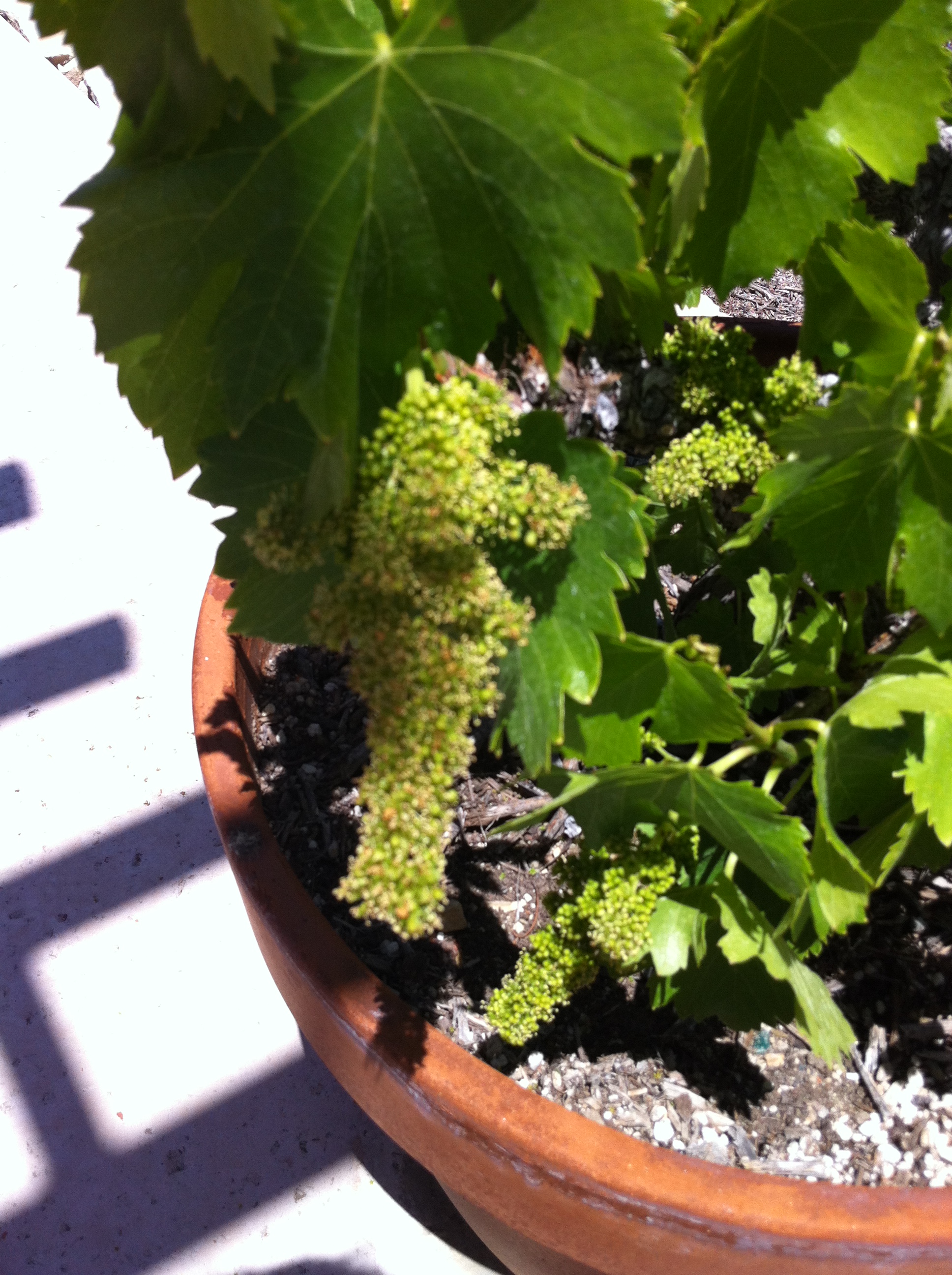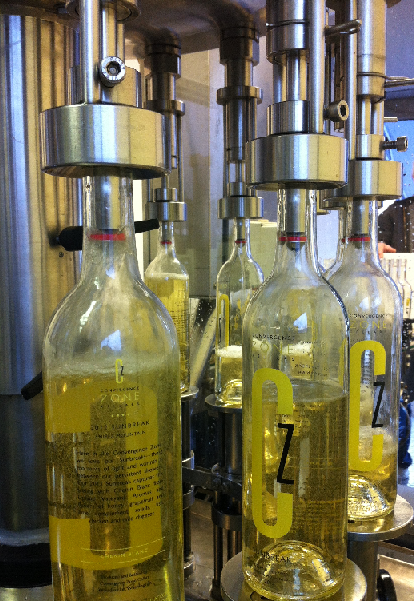It all started with a tweet.
Would you like to try an underappreciated grape? Try a Terret Noir! >> What is Terret Noir? https://t.co/NukpqIIlml
— enobytes wine online (@enobytes) January 14, 2018
Terret noir!?!
I was only familiar with this grape as one of the obscure little brother varieties in Châteauneuf-du-Pape. For some added geekiness, courtesy of Jancis Robinson’s Wine Grapes, the noir is a color mutation of the Terret grape with blanc and gris versions as well. Apparently, in the 1950s, Terret gris was the most widely planted grape variety in the Languedoc with over 20,000 acres!
Who knew? But now there are only around 257 acres of Terret gris left with approximately 3500 and 460 acres of Terret blanc and noir respectively. I was excited to read about Tablas Creek’s version of this obscure grape. I visited Tablas Creek several years ago where I geeked out over their nursery of Rhone varieties, taking many leaf and vine pictures that I uploaded to Wikipedia (as Agne27). I’ve always been impressed with Tablas Creek’s effort to introduced new varieties to the American consumer.
So I tweeted my enthusiasm and went to Tablas Creek’s website to see what they had available.
@TablasCreek is an awesome source for geeky wines and underappreciated grapes. Think I’ll head over to their website and see if I can get any of these shipped to Washington State https://t.co/XFHpomrzAZ
— Spitbucket.net (@SpitbucketBlog) January 15, 2018
Petit Manseng! Clairette blanche! Picardan! and, of course, Terret noir. But there was a catch—beyond many of them being sold out. Most of these uber geeky bottlings were limited to members of Tablas Creek’s wine clubs.
Instead of being bummed, my reaction was to appreciate the brilliance and good business sense. My biggest gripes about wine clubs, and why I join very few of them, is that they rarely offer compelling value.
What makes a wine club appealing to join?
Wine industry folks talk ad infinitum about how to improve wine clubs to encourage more sign-ups. It is no secret that the financial stability of consistent wine club sales is essential to many small wineries’ bottom line. With so many things competing for a consumer’s wallet, how does a winery entice folks to join?
Well for me, my decision to ultimately sign up for the Tablas Creek wine club was driven by three factors.
1.) How easy can I get your wines at home?

I live a little closer to Beaucastel in Seattle at around 8600km than Tablas Creek is to their partner estate. But I have no problem finding bottles of Ch. Beaucastel.
This is a big reason why I don’t join the wine clubs of many Washington (especially those in Woodinville) and Oregon wineries. Living in Seattle with an abundance of wine shops and tasting rooms close by, I can get most any wine I want from these local wineries. Yes, getting a 10-25% discount and invitation to “members only” events is nice but what is more appealing is access and exclusivity. This is where I tip my hat to Tablas Creek for their impressive selection of “Members Only” wines.
This created value in my mind because I wanted access to these wines. I want to try a Terret noir. I want a varietal Picardin. Even if I lived right next store to Tablas Creek, I still couldn’t get these wines easily if I wasn’t a member. That’s a strong incentive for a wine consumer like me.
Yes, I know plenty of my local Washington and Oregon wineries have “Members Only” bottlings, but very, very few of those wineries put them front and center on their wine shop page or highlight them as much as they should. And, truthfully, many of these “Members Only” bottlings are not that exciting compared to what the winery is already producing.
More than “Members Only”
A special one barrel “Members Only” blend? Um, okay that could be great but your regular red blend that I can buy is pretty darn good so why should I buy the whole cow and join your club when I’m already happy with the chocolate milk?
Now a three bottle “Members Only” set of the same grape variety but from 3 different clones, three different vineyards or 3 different kinds of oak barrels–THAT’S intriguing. That is not something I can regularly get from yours or any other winery. That’s something with compelling value and exclusivity.
In the case of Tablas Creek, I would have to do a fair amount of hunting on WineSearcher.com to find a bottle of Terret noir. While I can get their Esprit de Tablas and Patelin de Tablas blends at local wine shops, with these obscure varietal bottlings their wine club provides a chance to get something above and beyond their typical retail offering.
That’s intriguing. That’s worth buying the cow.
2.) How many bottles am I committing myself to?
But to be honest, I don’t really want a whole damn cow.
Frankly, I’m a bit of a slutty boozer that likes to play the field with many different types of wines and alcoholic beverages. Just peruse the archives of this “wine blog,” and you will see. For every couple of wine-related posts I do, I’m just as likely to post about a whiskey like the Edradour 10 year or a beer like the Bourbon County series from Goose Island.
I want to commit, but I’m truly only faithful to my wife.
That is why flexibility with wine clubs is so vital. Here, again, I’ll tip my hat to Tablas Creek for offering options of 6, 12 and 24 bottle commitments. Each tier has its ancillary perks, letting consumers pick just how much cow they want to bring home. Starting with a six-bottle a year commitment is not going to tie down my wine racks.
But I decided to go with the 12 bottle VINsider tier because A.) I saw 12 bottles on their shop page alone that I want to drink and B.) It seemed like having “Shipment wines specially selected by our winemakers” increased my odds of getting the geeky bottles I want.
3.) How likely is the style of wine going to change?

Though I do wonder what happened to this potted Grenache blanc vine. Is it still chilling outside the tasting room? Or did it grow up to be a big boy vine in the vineyard?
In our tumultuous era of mergers and winery acquisitions by big mega-corps, there is always a chance that your favorite winery is going to sell out. That potentially could mean a new style of wine driven more by focus groups rather than a focus on terroir. While I know that doesn’t matter to everyone, it matters to me and how I spend my money. Sometimes it is not even an acquisition that changes a style but rather a winemaker moving on with the new winemaker doing things just a little bit too different for your taste.
As a newbie wine lover, I learned this lesson the hard way when I first moved to Washington State in 2004. I fell in love with the wines of David Lake at Columbia Winery and joined their club. Failing health caused Lake to retire in 2006 with him passing away in 2009. Of course, you can’t blame the winery or David for that but the style of the new winemaker, Kerry Norton, just wasn’t to my taste. It took a year’s worth of unexciting wine club shipments for us to finally realize that the style had changed and wasn’t coming back, leading us to quit the club. This was before Gallo later bought Columbia and took it even further away from David Lake’s style.
Change happens. I get it. But if I’m going to invest in a wine club, I want to wager on one that I’m confident that I’ll be liking their wines for a while.
Looking at Tablas Creek’s website, I got a lot of comfort seeing the continuity of their leadership, viticulture and winemaking team. Many of the same people that were making those delicious wines I tried on my visit in 2012 are still there six years later.
That makes Tablas Creek feel like a solid bet of being a winery that I’m going to enjoy being part of their wine club.

